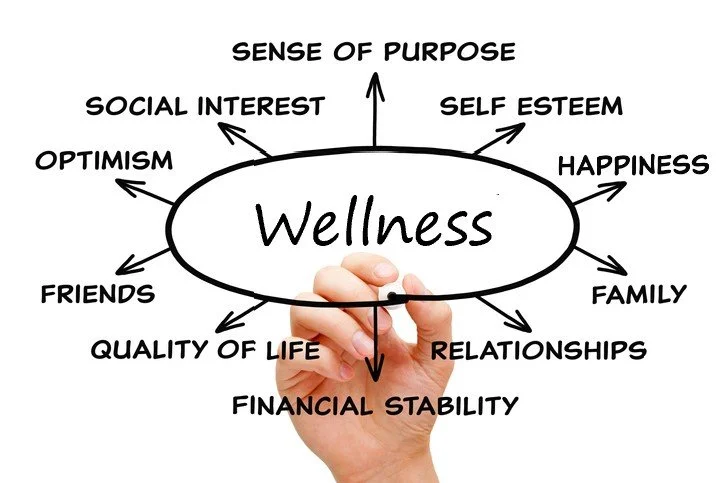Why Losing Weight, Eating Well, and Quitting Smoking Are Less Important Than We Think
Julianne Holt-Lunstad famously concluded in 2010 that those with good social relationships have a 50% greater likelihood of survival than those with poor or insufficient social connections. 1 Of those who never had in-person interactions in 2018, half were in fair-to-poor overall health. Also, in 2018, 46% of those surveyed reported sometimes or constantly feeling alone, and 47% felt left out. Furthermore, 43% feel isolated from others and that their relationships are not meaningful. 2 The recent pandemic has worsened things.
Unfortunately, we have an overwhelming tendency in the health profession to address diet, exercise, smoking, and drinking over the simple fact that just having a solid relationship is more important. Dr. Debbie Stoewen, a veterinarian and registered social worker, has observed that of the eight aspects of wellness, only two are commonly addressed in medicine; physical and environmental. I fall into this trap as well, unintentionally spending much more time talking about them on this site and in my office to my patients. The other six components are intellectual, emotional, social, spiritual, vocational, and financial. 3 These remaining aspects of wellness have a high degree of overlap and interconnectedness. Let's take a brief look at them.
Social Wellness
I have covered the social part of health before here. But in a nutshell, maintaining healthy relationships, enjoying the company of others, establishing friendships, caring and being cared for, and spending time in your community are the basics of your social life. I like to tell myself in the morning to be the person that makes others believe in the goodness of the human race. It puts smiles on peoples' faces, including mine.
Emotional Wellness
The next aspect of wellness is getting a handle on your emotions while allowing others to emote. Whole books have been written on the subject, but the nitty-gritty is that we need to process our and others' emotions properly. It is important not to let our emotions get the better of us while we are experiencing them, especially anger, but we also can't hide them away either. Additionally, we should not let someone's intense emotions rock our boat. A balance is needed where we can constructively handle our and others' emotions. A promising sign that you are succeeding is having a positive mindset most of the time. A neat little trick to maintaining your composure is not taking anything personally when someone is addressing you. The book "The Four Agreements" by Don Miguel Ruiz has more information on the subject. You can read it for free here.
Vocational Wellness
As I mentioned in this post a few weeks ago, fifty percent of people in one survey thought their jobs were meaningless. Given that we spend most of our lives at work, this is terrible news. Instead, your job should provide personal satisfaction and life enrichment that mesh with your goals and values. The good news is we don't need to quit if our job is unfulfilling. Changing how we value the company, the services we provide, the product we help produce, etc., goes a long way. Lastly, the attitude we bring to work is critical. A bad mood can be like cancer and spread; conversely, a positive attitude can make a huge difference. Check out the video below. Selling fish is a tough, smelly job, but the folks at Pike Place Fish Market always have fun while putting smiles on their customers' faces. They do their jobs so well, it is the only fish market I can name off the top of my head. The employees have made it world-famous. They can't change the fact that they have their hands in ice all day, fish are smelly and slimy, and their wages could be higher elsewhere. What they can change is their self-worth, teamwork, and mission to be smile-makers while selling seafood.
Spiritual Wellness
Spiritual wellness does not necessarily equate with having formal religion. Instead, it is more about finding purpose, value, and meaning in your daily life. Like the people in the fish video who have found purpose, meaning, and value at work, we must also strive to find them amongst our family, friends, and community. One of the best ways of community involvement is volunteering. Not surprisingly, volunteering is associated with reduced symptoms of depression, better self-reported health, fewer functional limitations, and lower mortality. 4 Providing help to people in need brings a sense of relief from our difficulties. It is particularly effective for seniors, ethnic minorities, those with little education, single people, and the unemployed. 5
Intellectual Wellness
As the world changes, so must we. Otherwise, we become disoriented and bewildered. New knowledge helps us make more sense of life's complexities, enabling us to become more stable—additionally, a strong sense of curiosity effortlessly pushes the process along. At some point, we master many aspects of life's complexities, and it behooves us to share what we have learned. You never know, but sharing knowledge can change lives. Think about it; we would never have come up with the smartphone if nobody shared their knowledge.
Financial Wellness
Some of the happiest people I know make little money. But, conversely, I know CEOs who are often miserable. Why the difference? Much of it has to do with their social, spiritual, vocational, and physical wellbeing. Those aspects aside, most of us can afford food, shelter, and medical care with moderate wages. However, we get into trouble when we don't manage our goals. A CEO who loses a ten million dollar deal may react with anger and frustration, all the while surrounded by luxury. On the flip side, someone I know with a steady job with modest wages quit her job and tried to start a business while living off her retirement savings without paying taxes. She ended up ok but had to face stiff penalties and potential jail time. Had she managed things a bit better, much grief would have been avoided. If one's goal is to make millions, have at it, but making informed financial decisions and investments, setting realistic goals, and preparing for short-term and long-term needs or emergencies are critical for financial and general wellness. 6
Conclusion
I have barely scratched the surface covering the six additional components of wellness. Even so, it is a lot to take in. So how can we incorporate these concepts into our lives? The way that I address all of them is by doing a nightly review of my day. It takes very little time to reflect on my day. First, I think about at least one thing I have done that an individual/people/family appreciated and make it my intention to do more of it. Try not to focus on only one aspect while ignoring others. It may help to write down all six of them until you have them memorized. Then, conversely, I think of the things that did not go well or made someone mad, sad, etc., and think of what could have been done differently to have a better outcome the next time a similar situation arises. The bottom line is that our physical health depends more upon our intellectual, emotional, social, spiritual, vocational, and financial health. In between our workouts and healthy meals, we should all work on them.






